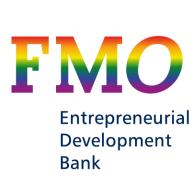As a leading impact investor, FMO supports sustainable private sector growth in developing countries and emerging markets by investing in ambitious projects and entrepreneurs. Our belief is that a strong private sector leads to economic and social development, and we have a proven track-record of 50+ years in empowering people to employ their skills and improve their quality of life.
Our recent focus has been on business continuity in the wake of the COVID-19 pandemic. It is precisely now, during these times of crisis, that it is important to continue investing in developing economies that are expected to be hit hard by the pandemic. While local governments are working hard to minimize the impact on their people and economies, we are needed now more than ever. Hence, we continue to empower entrepreneurs in developing economies to build a better world and boost resilience to withstand the pandemic.
Agribusiness, Food and Water
Babban Gona - Smallholder farmer service company in Nigeria
Babban Gona is a farmer services company which works with maize smallholder farmers in northern Nigeria, providing them with inputs, agronomic advice, post-harvesting support and marketing services. It is generally considered one of the few examples of farmer services companies in Africa managing to combine growth, strong social impact and financial sustainability. Since FMO first financed Babban Gona in 2017, the company’s farmer outreach has grown from around 17,000 to an expected 100,000 this year. FMO most recently signed a USD 15 mln 4-year facility, funded by MASSIF with the United States Development Finance Corporation (DFC) participating behind FMO. The facility consists of a USD 10 mln committed and a USD 5 mln uncommitted facility. With the new financing, FMO reconfirms its commitment to continue to be a key partner of Babban Gona and to support Babban Gona in its further growth and professionalization.
Fairtrade Access Fund - Impact investing fund focused on LATAM and Africa
FAF is an evergreen impact investing fund focused on smallholder farmers in Latin America and Africa. It provides debt products (mostly trade finance) to well-run producer organizations that have a sustainability certification, with an emphasis on Fairtrade. They have ensured financing and access to market to over 327,000 farmers in 2020 with 892,871 hectares under cultivation in 20 African and Latin American countries. FMO has signed a repeat transaction through a USD 10mln revolving credit facility with FAF, funded by MASSIF and FMO-A. As most clients are certified as sustainable, this has translated into premiums resulting in income stability for individual farmers, as well as investments in community-based healthcare, education, infrastructure, pandemic mitigation, and safety projects. Through this repeat transaction with FAF, FMO signals its commitment to a higher bar in sustainability, inclusion, and fairness in commodity markets.
COMASA - Peanut exporter in Nicaragua
Founded in 1992, COMASA is Nicaragua’s industry leader in peanut sourcing, processing, and exporting. As one of the country’s top 3 main export crops, COMASA supports 18,000 jobs during the harvest season, and procures raw peanuts from 180 producers. Additionally, the company has several environmental stewardship initiatives that have had a positive impact in hydrological recovery, livelihoods and soil conditions improvement. FMO signed a renewal of a USD 12.4 mln working capital line, ensuring that that COMASA can pay farmers for the nearly 153,000 tons of peanuts that they delivered to COMASA’s warehouses during the harvest, and that the peanuts can be processes and exported within the region and beyond.
Trans-Oil Group - Diversified agribusiness company in Moldova
Trans-Oil Group is a leading vertically integrated farming, oilseed crushing, trading and transportation logistic provider with operations primarily in Moldova. It is the largest agribusiness group in Moldova, focused on farming, trading, milling, oilseed crushing and animal feed, and employing nearly 2,000 people. A client of FMO since 2011, FMO signed a USD 43 mln syndicated facility, with FMO contributing USD 35 mln to this 100% Green Transaction.
Private Equity
Adenia Capital (V) LP - Pan-African fund investment
Adenia Capital V LP (Adenia V) is a private equity fund raised by Adenia Partners Ltd (Adenia), a pan-African PE firm and an existing relationship of FMO. Adenia V is targeting to raise USD 400m in commitments and will make buy-out and/or growth capital investments in medium sized companies across Africa. The aim is to bring much needed capital and apply world class investment skills to companies in Africa, with underlying objective to foster economic and social development. Adenia V will make equity investments in medium sized companies with proven business models and strive to turn these companies into local/regional champions. Adenia also aims to instil strong ESG culture in these companies and generate impact through implementation of ESG and impact action plans. Adenia has a very experienced and professional management team that is committed to building sustainable businesses employing high ESG standards. By supporting Adenia we collaborate with a local partner to empower entrepreneurs and promote local prosperity on the African continent.
Energy
C-Quest Capital SG Africa Holdings - Impact investment project developer in developing countries
FMO is providing USD 6.4 mln senior debt funding from its Access to Energy Fund to CQC. The transaction is a co-investment with FMO client BIX Capital, a debt fund in EN’s portfolio since 2016. CQC is a diversified impact-investment enterprise, with operational platforms in various developing countries. It structures and finances carbon-based investment programs, providing investors with the opportunity to purchase carbon credits while realizing substantial social impact. The transaction will aid the deployment of clean cooking stoves across various jurisdictions in Sub-Saharan Africa, which has a substantial impact on FMO’s core SDGs, including increased access to affordable and clean energy (SDG 7), reduced inequalities (SDG 10), and reduction of GHG emissions (SDG 13).

